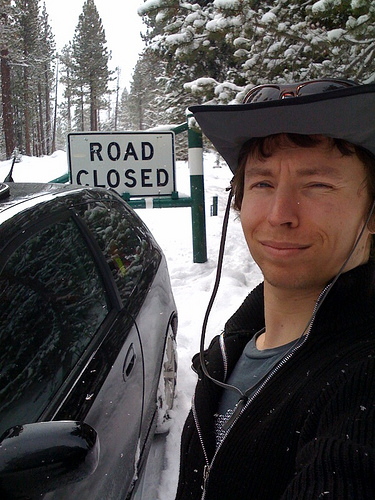There aren’t shortcuts. Merely direct paths. Most people don’t take them, because they frighten us. – Seth Godin
What does that mean?
Here is a more complete version of the quote:
“There aren’t many actual shortcuts. There are merely direct paths…
Most people don’t take them, because they frighten us–too direct, I guess. It’s easy to avoid the things that frighten us if we wander around for a while. Stalling takes many forms, and one of them looks like a shortcut.
Things that look like shortcuts are actually detours (disguised as less work).”
This quote, to me, is about the deception of shortcuts. There are always forks in the road. The shortcut somehow manages to look like the easier path.
The direct path, of course is very scary looking. There is work involved, risk, and even the potential of failure. This contrast entices many to try the shortcut.
We are warned to not fall prey to the siren song of shortcuts, whether they be in the form of procrastination or pretending to be an easier path.
Why is doing it the right way important?
How often have you tried a shortcut and ended up worse for it? Everything from trying to avoid traffic congestion to finding a less difficult way to write a paper, the shortcut is there to tempt you. Every once in a great while, it will work for you, but you usually end up regretting it, right?
Procrastination, or stalling, is one of the temptations calling to us, offering us safe haven from the trials and tribulations of doing that which seems so difficult. After all, what harm is there in taking a moment to gather my strength and my thoughts before continuing? Easy enough to say.
But that is where momentum goes from being our friend to being our enemy. You become an object at rest. Energy must be expended just to get you started up again, much less doing anything useful. And the other short cuts steal your momentum by making you take a harder or longer path.
Even if you manage to get back to where you started, you have still expended far more effort, energy, time, and/or money than you would otherwise have done, had you stayed on the direct path, and done it correctly the very first time. And to me, that is the point of this quote.
Where can I apply this in my life?
I suppose that depends on how easily distracted you are by shortcuts. While I didn’t consider it a shortcut, I am just back from a shower. It gave me a little time to consider what I was going to do with the quote, but for me, it often quickly becomes a real challenge.
Momentum can be as terrible an enemy as it is great as a friend. Objects at rest are as intimidating as objects in motion are unstoppable. Once we stall, whether on purpose or by happenstance, we have lost the positive momentum, and become that more troubling kind, an object at rest.
The weaker we are, the less momentum we have, the more easily we fall prey to the siren song of the shortcut, or of the stalling of a brief pause to catch our breath. It sounds so innocent, to get things done more easily or more quickly, but it rarely works out that way, at least not in my experience.
How does your luck run with shortcuts? How often do they work for you? Can you tell beforehand what the chances are that it will work? Or do you simply pick the short cut because it is less scary than the direct path, also known as the right way to go?
Take a moment to consider what shortcuts you have taken this past year, month, or day, depending on how often you do it. Try to come up with at least five or six which were miserable failures. Also try to find a time when you stalled for whatever reason. Grab some paper and write these down.
What do these things have in common? Were you at a tough point in the direct path, and looking for an easier way forward? Were you running low on momentum, and trying to conserve your energy? The general idea is to find a pattern which you can use to help recognize when you are weakest.
By knowing when you are most likely to succumb to the siren song of the shortcut, you can be better prepared to resist it and stay on the proper, or direct, path. What can you do to help you notice you are falling under the influence? Lashing yourself to the mast only worked for Odysseus. We need a better plan.
There is a new year approaching. As you prepare yourself for the new year, this might be something to consider changing in your life. Imagine how much more energy, time, and even cash you would have at the end of the year, if only you could avoid those pesky shortcuts. Don’t be frightened.
From: Twitter, @_Alexandra_Jaye
confirmed at : http://sethgodin.typepad.com/seths_blog/2012/06/quick-shortcuts.html
Photo by Brett Lider
Related articles
- Momentum is the Energy You Need! (billphillipsnews.com)
- Sharing a blog post from Seth Godin (leahthoughts.wordpress.com)
- 5 Simple Principles for Becoming an Expert (zenhabits.net)
- By changing nothing, nothing changes. (philosiblog.com)
- The Semiotics of Type by Seth Godin (dkhdickinson.com)


Your post reminded me of my Mum’s “shortcuts”, where she would try a road she didn’t know to see if we could walk home more quickly down it – it never worked!
Possibly the direct paths are less taken because they occupy that spot we examine the least – in front of our noses?
Yeah. My dad was good at ‘shortcuts’ as well. Such is life.
Thanks for stopping by, and for leaving a comment. I’m glad you found it to be of some use.